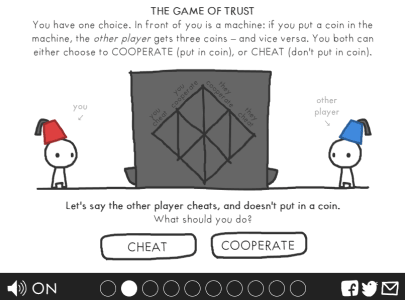The Evolution of Trust
Rating: 4.38 from 5 (based on 13 votes. 👍 11 – users like it, 👎 2 – disliked, 💬 0 – comments posted)
Released: July 2020
The Evolution of Trust – Play the Interactive Game Theory Simulator Online
The Evolution of Trust is one of the most fascinating trust games ever created. Based on mathematical models and game theory, it shows how different strategies of trust and deception play out over time. Designed by Boston game designer Nick Case, this simulator demonstrates why people do not always cooperate, even when cooperation is in their best interest. You can play The Evolution of Trust for free online on PlayMiniGames – a perfect mix of education and entertainment. 🧠
What Is The Evolution of Trust?
At its core, the game is about simple choices: two players decide whether to put in a coin. If both put a coin, both gain 2. If one puts and the other does not, the deceiver gains 3 while the altruist loses 1. This setup reveals powerful lessons about human behavior, society, and the fragile nature of trust. Through repeated interactions, you will see how strategies evolve and how cooperation or deception spreads.
Strategies You Will Encounter
- Altruists: Always put coins in, seeking mutual benefit.
- Deceivers: Rarely contribute, gaining at the expense of others.
- Offenders: Mimic deceivers’ behavior but become predictable and easy to exploit.
- Vindictive Players: Retaliate harshly if they feel wronged, leading to cycles of revenge.
- Imitators of Virtue: Appear trustworthy, waiting for a chance to exploit when it matters most.
- Others: Various mixed strategies that highlight the diversity of human decision-making.
Key Factors That Influence Trust
- Mutual Benefit: Trust must be rewarding for both sides, otherwise deception dominates.
- Repetition of Interactions: Trust strengthens when people interact repeatedly (around 10 times in the simulator).
- Communication Errors: Misunderstandings can ruin cooperation, as even honest intentions may appear deceptive if not clearly expressed.
- Short-Term vs Long-Term: Short-term choices reflect immediate behavior, but over the long term, the community of players shapes how the entire system evolves.
Why Play The Evolution of Trust?
This is more than a game – it’s an educational journey into human psychology, strategy, and society. By experimenting with different approaches, you’ll see why trust is fragile, why cooperation is rare, and how systems of fairness and fairness collapse under pressure. It’s recommended to play from a desktop for the full interactive experience, but it is playable on mobile as well.
Highlights at a Glance
- Based on Nick Case’s acclaimed explorable explanation of game theory.
- Simple coin mechanics reveal deep lessons about trust and deception.
- Multiple character strategies with unique behaviors.
- Shows the Majority Illusion and long-term effects of repeated interactions.
- Playable for free online at PlayMiniGames – no downloads needed.
FAQ
Who created The Evolution of Trust?
The game was designed by Boston game designer Nick Case, who has created several interactive simulations about society and psychology.
What is the main lesson of the game?
That trust is fragile, and while short-term choices often lead to deception, long-term repeated interactions make cooperation possible.
Is the game based on real research?
Yes. It’s inspired by game theory and studies of human cooperation, including the famous Prisoner’s Dilemma and Majority Illusion.
Can I play it on mobile?
Yes, though the desktop experience is recommended for full interactivity and ease of use.
Is it free?
Yes. The Evolution of Trust is free to play online on PlayMiniGames with no downloads required.

kittytoe
- 02-03-2021 14:29:07